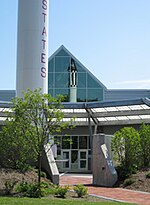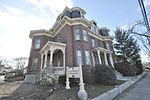NHTI – Concord's Community College
1961 establishments in New HampshireBuildings and structures in Concord, New HampshireCommunity colleges in New HampshireEducation in Concord, New HampshireTwo-year colleges in the United States ... and 3 more
USCAA member institutionsUniversities and colleges established in 1961Universities and colleges in Merrimack County, New Hampshire
NHTI – Concord's Community College is a public community college in Concord, New Hampshire. It is part of the Community College System of New Hampshire and is accredited by the New England Association of Schools and Colleges. The college, which opened in 1965, was known as New Hampshire Technical Institute until 2007, when its current name was adopted to reflect its growth as a community college with broad offerings in both technical and general education.
Excerpt from the Wikipedia article NHTI – Concord's Community College (License: CC BY-SA 3.0, Authors).NHTI – Concord's Community College
Delta Drive, Concord
Geographical coordinates (GPS) Address Nearby Places Show on map
Geographical coordinates (GPS)
| Latitude | Longitude |
|---|---|
| N 43.223055555556 ° | E -71.531666666667 ° |
Address
New Hampshire Technical Institute
Delta Drive
03301 Concord
New Hampshire, United States
Open on Google Maps









